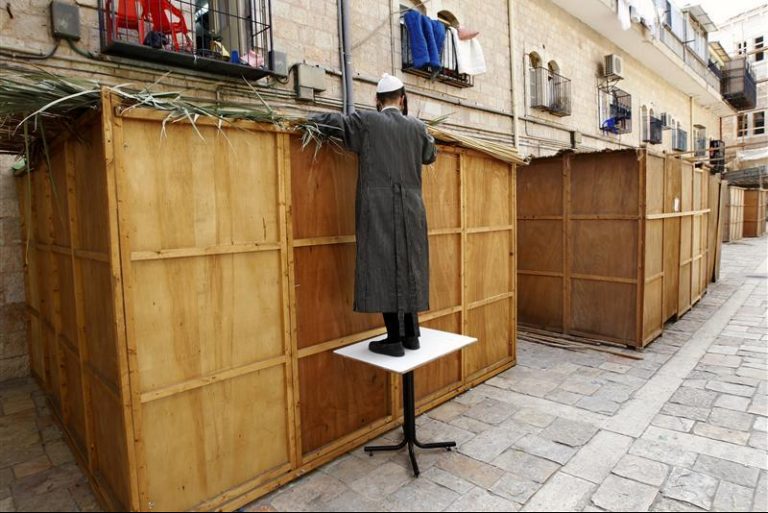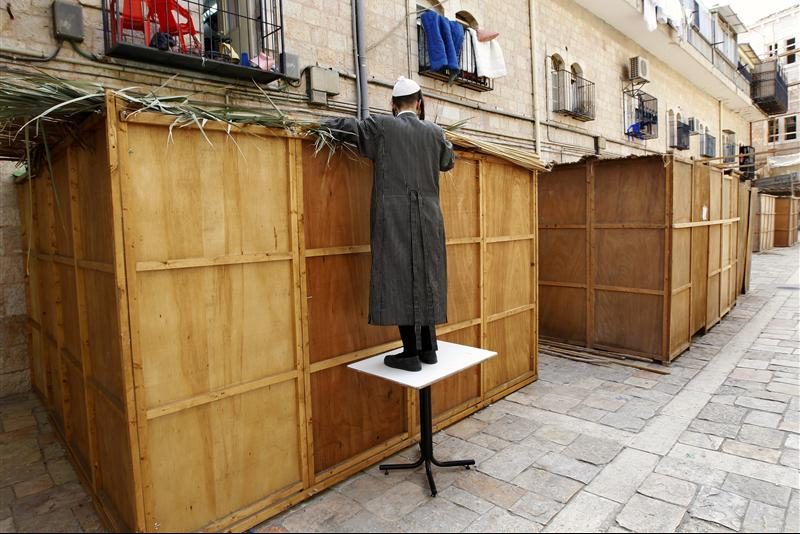 In the Torah, it is written, “But on the fifteenth day of the Seventh Month, when you harvest the produce of the Land, celebrate the Holiday of Hashem for seven days… You shall stay in “Sukkot” for seven days; every resident of Israel shall stay in “Sukkot.” In order that your generations shall know that I housed the Children of Israel in “Sukkot” when I took them out of the Land of Egypt.” (Vayikra 39: 42-43)
In the Torah, it is written, “But on the fifteenth day of the Seventh Month, when you harvest the produce of the Land, celebrate the Holiday of Hashem for seven days… You shall stay in “Sukkot” for seven days; every resident of Israel shall stay in “Sukkot.” In order that your generations shall know that I housed the Children of Israel in “Sukkot” when I took them out of the Land of Egypt.” (Vayikra 39: 42-43)
Our Sages have interpreted the expression “stay in” to mean “stay in your Sukkah, temporarily, in the manner that you live in your permanent homes.”
How should this be done?
Eat your meals in the Sukkah, study Torah in the Sukkah, entertain your guests in the Sukkah, relax in the Sukkah and, very importantly, unless for some reason you find it very uncomfortable, sleep in the Sukkah.
What type of meal is one obligated to eat in the Sukkah?
Answering the question from the reverse side, a person is not supposed to eat an “achilat keva,” a “substantial meal,” outside of the Sukkah.
What is the definition of a “Seudat Keva”?
A “Seudat Keva” is a “regular meal including bread” or some “significant other” type of eating, such as pasta or mini-pizza, chicken or meat, as opposed to a fruit or juice snack, a cup of coffee, soda, Snapple [unless that’s considered more significant since it’s made of “the best stuff on earth”] or water.
Others are careful not to eat anything outside of the Sukkah.
What blessing should be made before eating in the Sukkah?
The following blessing should be made before eating in the Sukkah:
“Blessed are You, O L-rd our G-d Who made us holy by Obligating us to perform His Commandments, and Commanded us to Stay In the Sukkah!”
First, the “Birchat HaNehenin,” is recited; afterwards, the Sukkah-related Berachah. The Birchat HaNehenin is the blessing made before partaking of an item in G-d’s world, such as a tuna-fish sandwich (in this case, the blessing is “…HaMotzi Lechem min HaAretz,” “…(that G-d is the One)… Who causes “bread” to be produced from the ground.” (I sometimes think that if G-d had only created the tuna-fish for the enjoyment of Man, it would have been enough!))
When is the Obligation Strongest?
The obligation to be in the Sukkah on the first two nights of the Holiday is the strongest (in Israel, it is only the first night). The practical difference between the “strong” obligation and the “weaker” obligation is when it is raining. In general one applies the principle “One who is suffering is not obligated to eat in the Sukkah.”
However, on the first night, one must make a great effort to make Kiddush in the Sukkah and to wash “Netilat Yadayim,” the washing of the hands before the eating of a minimal amount from the “Challah.” “Challah” is the special “bread” baked for Shabbat and the Holidays. The amount to be eaten is the size of an egg. Only thereafter may one retreat to the house, to complete the meal!
How Should One Feel in Such a Case?
Interestingly, the Talmud discusses the above question, even though one might be tempted to dismiss it with “What do you mean, it just rained – that’s all!” Apparently, the Talmud is of the opinion that the relationship between G-d and the Jewish People should be so close that at a time when in order to fulfill a Command of the Torah, it is necessary for it not to rain, then we could expect that Hashem, strange though it may seem, would not let it rain!
In any case, the answer given in the Talmud to the above question is that a person should feel like a servant who has poured a cup of wine for his master, and his master threw it in his face!
Other Times…
Other times than the first night of Sukkot, when it is raining moderately, enough to cause drops of water to fall from the “Sechach” into one’s food, or if it is VERY cold, or VERY hot, or if stinging insects have set up residence in the Sukkah, the obligation to eat in the Sukkah is cancelled. In fact, if one remains in the Sukkah while suffering, it is not like a situation which one would allow to exist in his own house and, since that is the basic measure of whether something should be done in the Sukkah, rather than being considered praiseworthy, that person is considered foolish.

